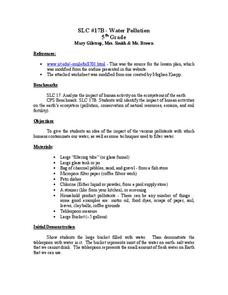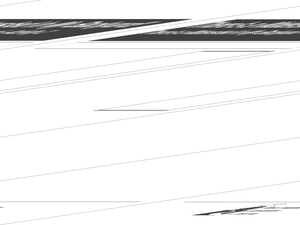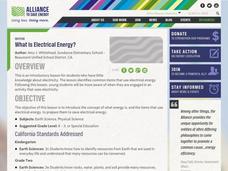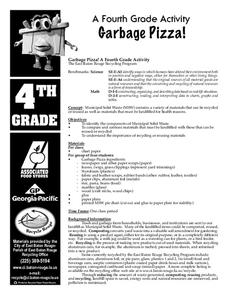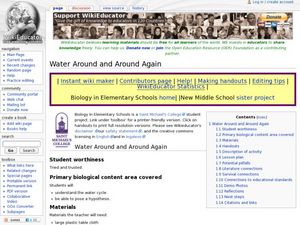Curated OER
Testing the Water
Students develop and test a hypotheses through collecting and recording water quality data. They perform their tests outdoors in a location with a safe stream and easy access for students. Their various experiments involve the entire...
Curated OER
Correlation Chapter 1
Students compare ways in which people form different cultures think about and deal with their physical environment and social conditions. They identify examples of change and recognize examples of cause and effect relationships. Students...
Curated OER
Water Pollution
Fifth graders investigate how humans pollute the water supply with a number of different contaminates. While working in small groups they examine screening, sedimentation, filtration, and chemical treatments as methods of water treatment.
Curated OER
Water Pollution
Fifth graders observe and record what happens when household products are added to a tank of water to depict water pollution. They brainstorm ideas of how to clean the contaminate out of the water before watching demonstrations of...
Curated OER
Exploration Watershed
Students discuss what a watershed is, and locate watersheds on a map. In this watershed lesson, students use the information they have been introduced to and create a color coded watershed map of their own.
Curated OER
Be a Watershed - Create a Living River
Students investigate water ways by conducting an experiment with classmates. In this natural resources lesson, students define a watershed and identify where large ones are located within the United States. Students utilize cups,...
Curated OER
LOOKING AT LAWNS
Students investigate the importance of plants to animals by exploring their own schoolyard. They record relevant observations, findings, and measurements, using written language, drawings, charts, and graphs. They describe ways in...
Curated OER
There's a Watershed in my Backyard!
Students explain what the term watershed is by creating a model. In this science, geography lesson, students demonstrate how the water moves in a watershed. Additionally, students learn about point source and nonpoint source pollution....
Curated OER
World Climate Growing Zones
Students create a map showing where crops would be grown around the world. In this crops lesson plan, students show how the world climate would produce different parts of the world at different times. Students fill out worksheets.
Curated OER
Water Pollution Experiments
Fifth graders conduct experiments in simulated water pollution using a box of items to hold "pollutants"and an aquarium, representing a waterway. They observe how "rain" from a watering can poured into the box washes the pollutants into...
Curated OER
Human Impact on the Environment and Pollution
Students illustrate the impact humans have on the environment through analogies and models. They observe demonstrations of human impact and pollution and create a composite picture of how people can have an impact on their environment.
Curated OER
Look At A Landfill
Students explore how landfills function. In this landfill lesson, students explore the use of landfills and the decomposition process by creating a model landfill. Students discuss pros and cons to landfills and how potential problems...
Curated OER
What is electrical energy?
Students distinguish between items with and without energy. For this energy lesson, students understand that natural resources power electrical apparatus and that energy needs to be saved.
Curated OER
Garbage Pizza
Fourth graders explore the concept of waste management. In this recycling lesson, 4th graders identify materials that must be landfilled as well as items that may be recycled or reused.
Curated OER
What's The Level?
Pupils examine the movement of the water table and saturation zones. They describe the movements of the water table and locate the saturation zones. Students identify the function of each saturation zone. They develop a model of the...
Curated OER
Water Around and Around Again
Students form a hypothesis for a water cycle experiment. In this water cycle instructional activity, students create their own environment with water and earth to study the water cycle. Students complete a handout to make a hypothesis...
Curated OER
Water Pollution
Fifth graders examine what contaminated water looks like, and how it becomes polluted. They examine a teacher demonstration of water is not polluted but does contain rocks and other things that do need to be cleaned out before drinking...
Curated OER
Commonalities and Differences from Africa to Cleveland as Evidence Through the Gullah Community Connection
Students explore Afro-American history. They identify the commonality between African, Carolinian and Cleveland Black culture. Students explore the water cycle, oceanography, hydrology and bio-geochemical processes. They discuss the...
Curated OER
Environment
Fifth graders receive a general overview of the world's environmental dilemmas thereby understanding the global implications of their actions. They examine their connection to the ecosystem by looking at the influence of the environment...




